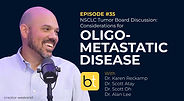BackTable / Tumor Board / Podcast / Episode #3
Combination Therapy and Clinical Trials for Advanced HCC: What They Really Mean
with Dr. Lingling Du, Dr. Jonathan Mizrahi, Dr. Adam Burgoyne and Dr. Zach Berman
In the past five years, the use of immunotherapeutic agents for advanced cancers has emerged as a promising alternative to tyrosine kinase inhibitors and chemotherapy, making it an exciting time to be practicing oncology. In this episode, Dr. Tyler Sandow interviews oncology experts about the landscape of advanced hepatocellular carcinoma (HCC) and the current state of immunotherapy treatments. He is joined by medical oncologists Dr. Jonathan Mizrah, Dr. Lingling Du, and Dr. Adam Burgoyne, as well as interventional oncologist Dr. Zachary Berman.
This podcast is supported by an educational grant from AstraZeneca Pharmaceuticals and Boston Scientific.

BackTable, LLC (Producer). (2025, January 17). Ep. 3 – Combination Therapy and Clinical Trials for Advanced HCC: What They Really Mean [Audio podcast]. Retrieved from https://www.backtable.com
Stay Up To Date
Follow:
Subscribe:
Sign Up:
Podcast Contributors
Synopsis
Drs. Burgoyne and Mizrahi provide a primer on immunotherapy and explain how they communicate the principles of this treatment to their patients. Dr. Du discusses the Imbrave clinical trial and how recent studies have shown improved overall survival when immunotherapeutic agents are used, especially when multiple agents targeting various pathways are employed. When choosing between different regimens, the doctors consider factors such as the patient's underlying liver function, symptom burden, and prior treatments.
Importantly, the doctors also discuss contraindications to immunotherapy, including a history of organ transplant, autoimmune disease, and poor performance status—all of which put patients at high risk for deterioration with this treatment. The treatment of patients with poor liver function remains controversial, as underlying cirrhosis may prevent the recovery of liver function. Dr. Berman outlines recent clinical trials studying the effects of transarterial chemoembolization (TACE) combined with immunotherapy. Finally, the doctors discuss the future of HCC treatment and the benefits of continued innovation in both interventional and medical oncology.
Timestamps
00:00 - Introduction to Immunotherapy
04:32 - Notable Clinical Trials
13:39 - HCC Etiology and Immunotherapy Outcomes
18:43 - Contraindications for Immunotherapy
23:05 - Adverse Effects from Treatment
25:14 - Combination Therapy
36:22 - Considerations for Immunotherapy Dosing
40:26 - The Future of HCC Treatment
Resources
Atezolizumab plus Bevacizumab in Unresectable Hepatocellular Carcinoma, IMbrave150 Trial (Finn et al, 2020):
https://pubmed.ncbi.nlm.nih.gov/32402160/
Tremelimumab plus Durvalumab in Unresectable Hepatocellular Carcinoma, HIMALAYA Trial (Abou-Alfa et al, 2022):
https://evidence.nejm.org/doi/full/10.1056/EVIDoa2100070
Nivolumab versus sorafenib in advanced hepatocellular carcinoma (CheckMate 459): a randomised, multicentre, open-label, phase 3 trial (Yau, 2022):
https://www.thelancet.com/journals/lanonc/article/PIIS1470-2045(21)00604-5/abstract
Nivolumab (NIVO) plus ipilimumab (IPI) vs lenvatinib (LEN) or sorafenib (SOR) as first-line treatment for unresectable hepatocellular carcinoma (uHCC): First results from CheckMate 9DW (Galle, 2024):
https://ascopubs.org/doi/10.1200/JCO.2024.42.17_suppl.LBA4008
Randomized Phase 3 LEAP-012 Study: Transarterial Chemoembolization With or Without Lenvatinib Plus Pembrolizumab for Intermediate-Stage Hepatocellular Carcinoma Not Amenable to Curative Treatment (Llovet, 2022):
https://pubmed.ncbi.nlm.nih.gov/35119481/
EMERALD-1: A phase 3, randomized, placebo-controlled study of transarterial chemoembolization combined with durvalumab with or without bevacizumab in participants with unresectable hepatocellular carcinoma eligible for embolization (Lencioni, 2024):
https://ascopubs.org/doi/10.1200/JCO.2024.42.3_suppl.LBA432
CME Accreditation Information:
https://f7cae4ec-b69e-490d-9e0f-19b16a6f146d.usrfiles.com/ugd/f7cae4_a7c37ea3cd1b4d3fa53d5edf8dfe255b.pdf
Transcript Preview
[Dr. Adam Burgoyne]
I think the other important point for both of these studies is it's really a combinatorial approach of targets. We were chatting a little bit before we started about, we think of immunotherapy usually from the PD-1/PD-L1 axis. In the earliest stages of immunotherapy or HCC, we were using single-agent PD-1 inhibitors like nivolumab or pembrolizumab, but it was really these combination strategies of either anti-PD-1, anti-VEGF or anti-PD-L1 plus CTLA-4 that really moved the needle forward in terms of improving outcomes.
[Dr. Tyler Sandow]
It's almost like you always needed something else with it.
[Dr. Adam Burgoyne]
Exactly.
[Dr. Lingling Du]
Absolutely. That's a great point. That's exactly how I remember. It was back in 2015 when single-agent nivolumab data was first presented from the CheckMate-040 study at ASCO annual meeting, we started using single-agent nivolumab. When we had a good response, we had a good, durable response, but everything after that, the front-line nivolumab trial was negative. Then pembro was not that great. We very soon realized that we definitely need more than one single agent PD-1/PD-L1 blockade.
The Materials available on BackTable are for informational and educational purposes only and are not a substitute for the professional judgment of a healthcare professional in diagnosing and treating patients. The opinions expressed by participants of the BackTable Podcast belong solely to the participants, and do not necessarily reflect the views of BackTable.


















